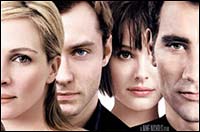Too Closer For Comfort
A review of the film Closerby j. brotherlove
 Describing Closer as a film about relationships is akin to calling Who’s Afraid of Virginia Woolf? a movie about a dinner party; there’s a bit more at work beneath the surface. Columbia Pictures’ audacious gabfest, directed by Mike Nichols (who also directed Who’s Afraid of Virginia Woolf?), is a tale of love, truth and betrayal.
Describing Closer as a film about relationships is akin to calling Who’s Afraid of Virginia Woolf? a movie about a dinner party; there’s a bit more at work beneath the surface. Columbia Pictures’ audacious gabfest, directed by Mike Nichols (who also directed Who’s Afraid of Virginia Woolf?), is a tale of love, truth and betrayal.
Closer stars Natalie Portman as Alice, a stripper from New York; Jude Law as failed novelist and obituary-writer, Dan; Julia Roberts as Anna, a professional photographer; and Clive Owen as Larry, a dermatologist.
There’s not much filler in Closer. An expedited examination of four years in the love lives of four individuals, the film focuses on the moments the individuals meet, fall in love, fall out of love and fall in love again in an emotional merry-go-round.
Appropriately, the beautiful cast is set against a cheerless London as they yell, lie, cry and wax poetically on all aspects of being in love. And yet, with their collective knowledge, they refer to hurtful patterns and deceitful behavior in pursuit of such true love.
Dan is the most clueless of the lot, lacking the foresight to stay on equal ground with the objects of his affection. Just when he thinks he knows what he wants, he sees something better. Stripped away of choice, he fools himself into believing he had love figured out all the time.
Roberts delivers a quiet, strong performance as a woman torn between what she wants in a lover and what she needs. As Anna, she spends much of the film apologizing for her actions to Alice, to Dan and to Larry.
As for Larry, rarely does a character as charismatic and loathsome grace the screen with such finesse. However, unlike Aaron Eckhart’s performance in Your Friends & Neighbors, Clive manages to convey a cunning vulnerability that prevents him from being completely despised at the end of the film.
Questionably, the character who comes out ahead is Alice (Portman in an unusually sublime performance). Despite being unable to control her outcome, Alice appears to have the best grip on how attraction, love and relationship interact, despite being the youngest in the coterie. When challenged by Dan about how she ends relationships she argues the best way is “I don’t love you anymore. Goodbye.”
The true star of Closer is the Oscar-worthy script by Patrick Marber. Adapted from his play, Marber’s provocative dialogue crackles and cuts through the fog of cigarettes and infidelity. In these days of seen-it-all/heard-it-all media, it is impressive to see a film with dialogue so electric it justifies an R rating on its own.
Which is to say, Closer isn’t always easy to sit through. Four-letter words are flung in rapid-fire repartee with few breaks (an Internet chat room scene is especially racy; a heated breakup between Anna & Larry is uncomfortably tense). It’s easy to see how the man who directed the verbally-charged Woolf? was attracted to this material.
Deceptive, disarming and self-absorbed, Closer is an intense examination of modern love and relationships. Despite an ending that is perhaps more obvious than intended, Closer is another impressive notch in Mike Nichols belt and puts dialogue back on the celluloid map.

I’d say this is the most spot on review of this film I’ve read. Well done.
And do you know how the film ending differed from the play ending?
I’ve been reading about the ending of the play and how the movie could be interpreted as having the same ending. I don’t agree with that line of thought, though.
I do wish I could have seen those characters on stage.
great review! very insightful… do you critique professionally?
nikki.
I’ve heard about the ending of the play, too, and I also disagree with the line of thought that the movie is supposed to have a similar ending. I am interested, though, why you thought the movie ended differently.



